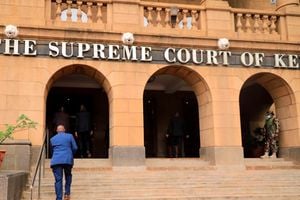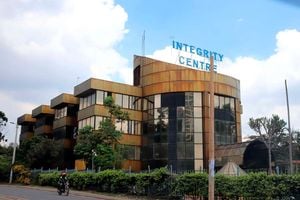
There could never be a better monument to corruption than the chaotic conurbation resulting from land grabbing.
If our governance landscape is more of a dystopian landscape, filled with writhing masses of broken dreams and the broken shells of what-might-have-been, than the Elysian Fields of abundant felicity and beatific surfeit, it is because we are at a conjunction of relentless devastation, simultaneously paying the present cost of past corruption, and sowing the deadly seeds of present turpitude to punish future generations.
In a word, we are wholly consumed with the desperate simultaneous occupations of evading and mitigating the disastrous consequences of orgiastic wickedness of years gone by, while flouting rules, cutting corners, breaching standards, subverting values and scorning ethics with a headlong myopia that should be utterly frightful to anyone endowed with minimal discernment.
When is the next high-rise tenement block going to collapse into a heap of sorrow, as though built with dust? Where is the next fire going to break our and rage for hours, consuming all in its way with a devastating, volcanic rage? The answer to this question is minutely documented in the Report of the Commission of Inquiry into Illegal/Irregular Allocations of Public Land, or the Ndung'u Report.
This sensational tome records the ways by which public officials conspired to privatise public roads, passageways and easements, along with public property, denying children playgrounds, urban dwellers green open spaces, closing off roads in congested commercial, industrial and residential areas, and making it impossible to develop or expand roads, schools, hospitals, sanitation and other public amenities, thus turning our urban areas into dangerous, teeming, malodorous slums.
Our roads never have allowances for broken down motor vehicles to repair and to leave other traffic unimpeded. Neither do they have safe spots for public transport commuters to embark or alight.
Thoroughfares are essentially nothing but glorified paths squeezing through informal and dangerously situated dwelling shacks, makeshift stalls, open-air workshops, warehouses and eateries, unlicensed filling stations, illegal schools and backstreet clinics and sundry establishments which casually bring flame and flammable fluid cheek-to-jowl.
In sum, there could never be a better monument to corruption than the chaotic conurbation resulting from land grabbing, and the havoc it wreaks upon spatial and urban development planning.
Because the land on which this bedlam is founded happens to be stolen, reference to formal rules is not just inconvenient, it is altogether illicit in this upside-down moral universe.
Most, if not all enterprises in these milieus are not just unlicensed, they do not officially exist, meaning that they cannot be regulated or taxed. Because no one is investing in necessary measures to keep premises safe, operators routinely accrue sufficient margins to afford bribes and kickbacks for any licensing, planning, inspection and compliance officials who may come calling.
This way, formal institutions established to keep the public safe and healthy are drawn by the irresistible gravitational force of this ethical black hole, and the public is thereby exposed to multiple sources of dangers without any hope of amelioration.
It stands to reason then, that as a general rule, more, not less, disastrous events, directly or indirectly connected with catastrophic failures of governance in terms of regulation and the enforcement of standards, are to be expected where others have occurred.
The reasons are obvious; the historical root causes of governance and regulatory failure are not just necessary conditions, but also rigid or one might go so far as say, mandatory drivers of systemic subsequent corruption, which exponentially increase the probability of disastrous failure with horrendous human toll. From casual appreciation, these deadly occurrences have the appearance of isolated and even accidental turns of bad luck, but careful analysis easily uncovers mediated original sins.
If you wish to proceed beyond this original sin, and investigated the reasons and causes of and grabbing itself, you will end up with the mother lode of our transgressions as a nation, which is the extremely reckless neglect, by our independence generation and the one that followed after it, of the imperative to decolonise Kenya after the attainment of independence and majority rule.
As a result of this fateful oversight, governance mutated into a contest between a citizenry obliged to commit to a state whose sole raison d'etre for nearly a century had been the total repression, enslavement and ruthless plunder of the and its people.
The substitution of flags atop masts all over the country was not sufficient to obliterate the experiences of a majority who had come to internalise subversion of the predatory state as both a moral necessity and an existential imperative.
At the very minimum, an adequate decolonising intervention had to purge the state of predatory proclivities, and inoculate the elite, through comprehensive education, against the temptations of impunity. Such an exercise would make it possible for the public to establish trust with the state through an enlightened elite, in order that they dispense with the urge to sabotage the state apparatus.
Failing that, we set ourselves firmly on the path of road carnage, collapsing flats and exploding neighbourhoods; it has to do with a fateful, intense conflict in the soul of our Republic.
- Mr Ngéno is an Advocate of the High Court










